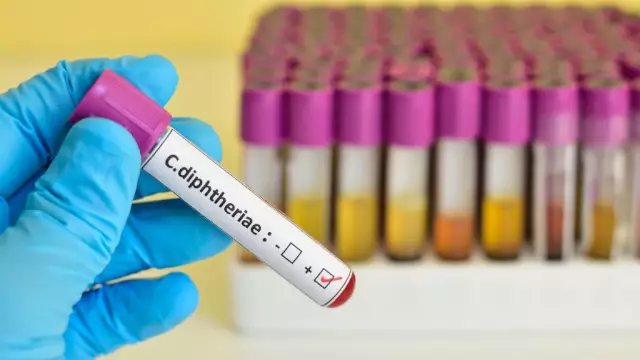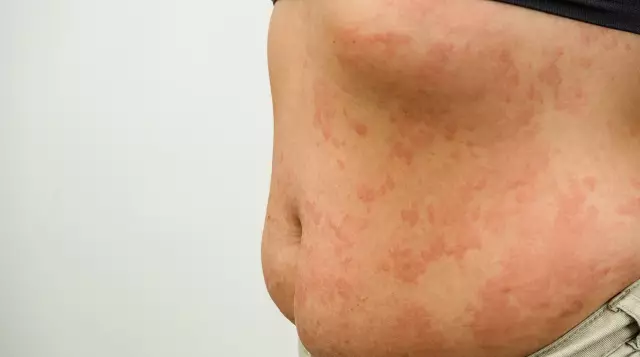- Author Rachel Wainwright wainwright@abchealthonline.com.
- Public 2023-12-15 07:39.
- Last modified 2025-11-02 20:14.
Diphtheria
Brief description of the disease

Diphtheria is infectious and transmitted by airborne droplets. The source of infection can be a sick person or a healthy carrier of diphtheria bacteria. Healthy carriers of diphtheria bacteria have antitoxic immunity that firmly resists the infectious agent.
Diphtheria is characterized by inflammation of the mucous membrane of the mouth and nasopharynx, less often - of the genitals, eyes and open wounds. Even less often, there is a simultaneous defeat of several organs.
Diphtheria symptoms
The causative agent of diphtheria is a diphtheria bacillus. Getting on the mucous membrane (or on the injured surface of the skin) actively releases toxins that cause the death of epithelial tissue. Further, toxins enter the bloodstream, and general intoxication of the body occurs.
The main symptoms of diphtheria are weakness and pallor of the skin. When examining the pharynx, with symptoms of diphtheria, you can notice a grayish coating covering the enlarged tonsils, larynx and lateral pharyngeal walls. Difficulty swallowing and sore throat can also be the primary symptoms of diphtheria. Along with everything, the cervical lymph nodes increase and become painful, the mucous membranes of the pharynx and the soft tissues of the neck swell. Diphtheria in children can be accompanied by loss of consciousness, high body temperature, chills. There is also profuse sweating, tachycardia.
The more toxins released by the pathogen, the wider the area of the affected epithelium and the more dangerous the general intoxication. The toxin that has entered the blood quickly penetrates the tissues and can cause disturbances in the functioning of the heart and nervous system.
Diphtheria treatment
With the appearance of the first signs of diphtheria, immediate hospitalization of the patient is necessary. The success of diphtheria treatment largely depends on the timely administration of antitoxic serum: the sooner it is used, the lower the risk of complications and death. The dose of PDS (anti-diphtheria serum) is prescribed by a doctor and depends on the severity of diphtheria. Before the introduction of serum, as a rule, a test for sensitivity to the drugs contained in it is carried out. Diluted serum in small quantities is injected into the patient's forearm and, after 30 minutes, the resulting papule is checked. If its size does not exceed the permissible 10 mm, then another dose of serum is injected, undiluted, but not therapeutic (also for the sample). After half an hour, in the absence of a reaction, a therapeutic serum is injected intramuscularly.
The bed rest of the patient with diphtheria is established depending on the form of the disease. The patient's food in the hospital should be liquid (semi-liquid) so as not to injure the mucous membrane of the mouth and oropharynx. After the plaque disappears from the mucous membrane, the patient can be transferred to a normal diet. At the same time, in the treatment of diphtheria, antibiotics and disinfectant solutions for gargling are prescribed.
Prevention of diphtheria

The main measure for the prevention of diphtheria has always been and remains immunization, i.e. vaccination against diphtheria of the population. The vaccine contains toxoid - the same diphtheria toxin secreted by the pathogen, only weakened. Such a vaccine gives immunity against the causative agent of diphtheria for 10 years.
Vaccinations against diphtheria have practically no contraindications, which helps to prevent serious consequences for the body caused by this disease. First, diphtheria strikes the heart, causing serious damage and heart failure. Secondly, the work of the nervous system will be disrupted, which will lead to paralysis of the soft palate, swelling of the eyelids and strabismus. Thirdly, there may be violations in the work of the kidneys - a consequence of toxic nephrosis. And, fourthly, pneumonia can develop - inflammation of the lung tissue with damage to the alveoli.
After the diphtheria vaccination, you may feel unwell, weak, and swelling and redness will appear at the injection site. Such a reaction of the body to a weakened diphtheria toxin is normal, moreover, it is short-lived. More serious adverse reactions are usually rare, 10-14 days after the vaccine is given.
YouTube video related to the article:
The information is generalized and provided for informational purposes only. At the first sign of illness, see your doctor. Self-medication is hazardous to health!






